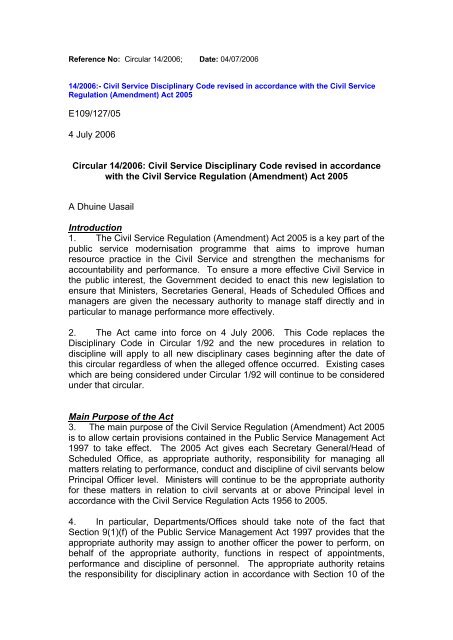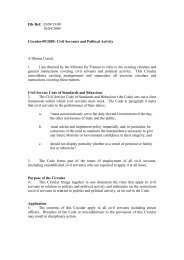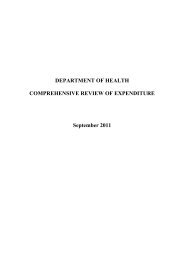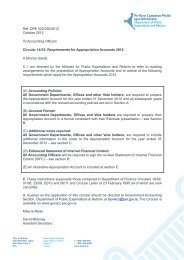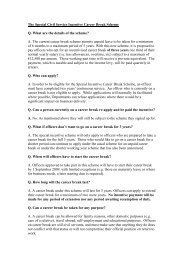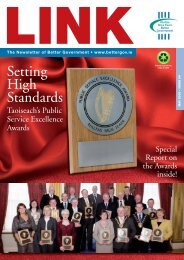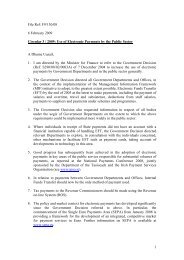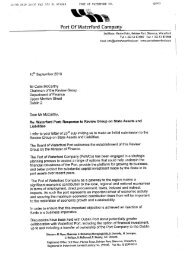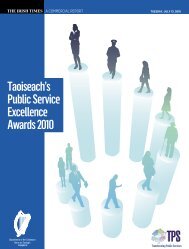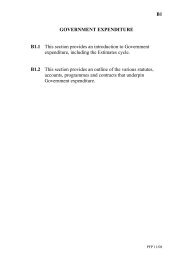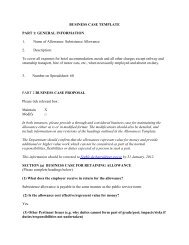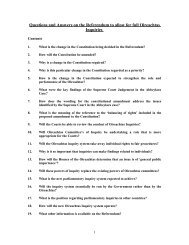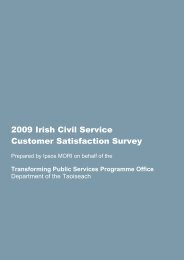Disciplinary Code - Human Resource Management in the Civil Service
Disciplinary Code - Human Resource Management in the Civil Service
Disciplinary Code - Human Resource Management in the Civil Service
You also want an ePaper? Increase the reach of your titles
YUMPU automatically turns print PDFs into web optimized ePapers that Google loves.
Reference No: Circular 14/2006; Date: 04/07/200614/2006:- <strong>Civil</strong> <strong>Service</strong> <strong>Discipl<strong>in</strong>ary</strong> <strong>Code</strong> revised <strong>in</strong> accordance with <strong>the</strong> <strong>Civil</strong> <strong>Service</strong>Regulation (Amendment) Act 2005E109/127/054 July 2006Circular 14/2006: <strong>Civil</strong> <strong>Service</strong> <strong>Discipl<strong>in</strong>ary</strong> <strong>Code</strong> revised <strong>in</strong> accordancewith <strong>the</strong> <strong>Civil</strong> <strong>Service</strong> Regulation (Amendment) Act 2005A Dhu<strong>in</strong>e UasailIntroduction1. The <strong>Civil</strong> <strong>Service</strong> Regulation (Amendment) Act 2005 is a key part of <strong>the</strong>public service modernisation programme that aims to improve humanresource practice <strong>in</strong> <strong>the</strong> <strong>Civil</strong> <strong>Service</strong> and streng<strong>the</strong>n <strong>the</strong> mechanisms foraccountability and performance. To ensure a more effective <strong>Civil</strong> <strong>Service</strong> <strong>in</strong><strong>the</strong> public <strong>in</strong>terest, <strong>the</strong> Government decided to enact this new legislation toensure that M<strong>in</strong>isters, Secretaries General, Heads of Scheduled Offices andmanagers are given <strong>the</strong> necessary authority to manage staff directly and <strong>in</strong>particular to manage performance more effectively.2. The Act came <strong>in</strong>to force on 4 July 2006. This <strong>Code</strong> replaces <strong>the</strong><strong>Discipl<strong>in</strong>ary</strong> <strong>Code</strong> <strong>in</strong> Circular 1/92 and <strong>the</strong> new procedures <strong>in</strong> relation todiscipl<strong>in</strong>e will apply to all new discipl<strong>in</strong>ary cases beg<strong>in</strong>n<strong>in</strong>g after <strong>the</strong> date ofthis circular regardless of when <strong>the</strong> alleged offence occurred. Exist<strong>in</strong>g caseswhich are be<strong>in</strong>g considered under Circular 1/92 will cont<strong>in</strong>ue to be consideredunder that circular.Ma<strong>in</strong> Purpose of <strong>the</strong> Act3. The ma<strong>in</strong> purpose of <strong>the</strong> <strong>Civil</strong> <strong>Service</strong> Regulation (Amendment) Act 2005is to allow certa<strong>in</strong> provisions conta<strong>in</strong>ed <strong>in</strong> <strong>the</strong> Public <strong>Service</strong> <strong>Management</strong> Act1997 to take effect. The 2005 Act gives each Secretary General/Head ofScheduled Office, as appropriate authority, responsibility for manag<strong>in</strong>g allmatters relat<strong>in</strong>g to performance, conduct and discipl<strong>in</strong>e of civil servants belowPr<strong>in</strong>cipal Officer level. M<strong>in</strong>isters will cont<strong>in</strong>ue to be <strong>the</strong> appropriate authorityfor <strong>the</strong>se matters <strong>in</strong> relation to civil servants at or above Pr<strong>in</strong>cipal level <strong>in</strong>accordance with <strong>the</strong> <strong>Civil</strong> <strong>Service</strong> Regulation Acts 1956 to 2005.4. In particular, Departments/Offices should take note of <strong>the</strong> fact thatSection 9(1)(f) of <strong>the</strong> Public <strong>Service</strong> <strong>Management</strong> Act 1997 provides that <strong>the</strong>appropriate authority may assign to ano<strong>the</strong>r officer <strong>the</strong> power to perform, onbehalf of <strong>the</strong> appropriate authority, functions <strong>in</strong> respect of appo<strong>in</strong>tments,performance and discipl<strong>in</strong>e of personnel. The appropriate authority reta<strong>in</strong>s<strong>the</strong> responsibility for discipl<strong>in</strong>ary action <strong>in</strong> accordance with Section 10 of <strong>the</strong>
<strong>Civil</strong> <strong>Service</strong> Regulation (Amendment) Act 2005 which amends Section 15 of<strong>the</strong> <strong>Civil</strong> <strong>Service</strong> Regulation Act 1956.5. In addition to devolv<strong>in</strong>g managerial responsibility as envisaged under<strong>the</strong> 1997 Act, <strong>the</strong> 2005 Act <strong>in</strong>troduces <strong>the</strong> follow<strong>in</strong>g changes <strong>in</strong> humanresource practice:i. discipl<strong>in</strong>ary action may be taken <strong>in</strong> cases of underperformance as wellas <strong>in</strong> cases of misconduct, irregularity, neglect or unsatisfactorybehaviourii.iii.iv.discipl<strong>in</strong>ary action <strong>in</strong> cases of underperformance can be taken onlywhen <strong>the</strong> staff member has been warned and given <strong>the</strong> opportunity toimprove his or her performance and where appropriate tra<strong>in</strong><strong>in</strong>g anddevelopment measures have been takensuspension without pay can be used as a discipl<strong>in</strong>ary measureany suspension pend<strong>in</strong>g <strong>the</strong> conclusion of discipl<strong>in</strong>ary proceed<strong>in</strong>gs willbe suspension on “ord<strong>in</strong>ary remuneration” <strong>in</strong> accordance with Section 9of <strong>the</strong> <strong>Civil</strong> <strong>Service</strong> Regulation (Amendment) Act 2005; this amendsSection 14 of <strong>the</strong> 1956 Act which provided that staff may be suspendedwithout pay pend<strong>in</strong>g <strong>the</strong> outcome of a discipl<strong>in</strong>ary <strong>in</strong>vestigationv. a person may be appo<strong>in</strong>ted to be an established civil servant on <strong>the</strong>basis of a probationary contractvi.civil servants, o<strong>the</strong>r than those appo<strong>in</strong>ted or dismissed by Government,will be brought with<strong>in</strong> <strong>the</strong> scope of <strong>the</strong> Unfair Dismissals Acts and <strong>the</strong>M<strong>in</strong>imum Notice and Terms of Employment Acts 1 ; civil servants mayappeal dismissals to <strong>the</strong> Rights Commissioner and <strong>the</strong> EmploymentAppeals Tribunal and possibly to <strong>the</strong> Courts.6. Departments/Offices must make <strong>the</strong>mselves fully aware of <strong>the</strong> terms of<strong>the</strong> new legislation and <strong>in</strong> particular of <strong>the</strong> new powers and responsibilities setout <strong>in</strong> <strong>the</strong> Act and consider, as a matter of priority, what <strong>in</strong>ternal proceduresare required to give full effect to its provisions.<strong>Discipl<strong>in</strong>ary</strong> Procedures – General Pr<strong>in</strong>ciples7. It is essential that staff be managed appropriately, fairly, andconsistently <strong>in</strong> all aspects of <strong>the</strong>ir work. Most problems relat<strong>in</strong>g tounderperformance and conduct can be dealt with before reach<strong>in</strong>g <strong>the</strong> po<strong>in</strong>t atwhich discipl<strong>in</strong>ary action is contemplated by management. Failure to dealwith problems of underperformance and misconduct places an unfair burdenon o<strong>the</strong>r staff. Managers and supervisors must take responsibility, <strong>in</strong> <strong>the</strong><strong>in</strong>terests of <strong>the</strong> Department/Office and all <strong>the</strong>ir staff, for tackl<strong>in</strong>g, <strong>in</strong> an1See Appendix 1 regard<strong>in</strong>g application of <strong>the</strong> Unfair Dismissals Acts and <strong>the</strong> M<strong>in</strong>imum Notice and Terms ofEmployment Acts
appropriate way, underperformance, misconduct, irregularity, neglect orunsatisfactory behaviour.8. However, discipl<strong>in</strong>ary action must be taken <strong>in</strong> certa<strong>in</strong> circumstances.Where such cases arise, Departments/Offices must ensure that officersaga<strong>in</strong>st whom discipl<strong>in</strong>ary measures are proposed, are dealt with <strong>in</strong> a fair andequitable manner <strong>in</strong> accordance with <strong>the</strong> <strong>Civil</strong> <strong>Service</strong> Regulation Act and <strong>the</strong>Industrial Relations Act 1990 (<strong>Code</strong> of Practice on Grievance and <strong>Discipl<strong>in</strong>ary</strong>Procedures) (Declaration) Order, 2000 which has <strong>the</strong>se general pr<strong>in</strong>ciples:· that details of any allegations or compla<strong>in</strong>ts are put to <strong>the</strong> employeeconcerned· that <strong>the</strong> employee concerned is given <strong>the</strong> opportunity to respond fullyto any such allegations or compla<strong>in</strong>ts· <strong>the</strong> employee concerned is given <strong>the</strong> opportunity to avail of <strong>the</strong> right tobe represented dur<strong>in</strong>g <strong>the</strong> procedure· that <strong>the</strong> employee concerned has <strong>the</strong> right to a fair and impartialdeterm<strong>in</strong>ation of <strong>the</strong> issues concerned, tak<strong>in</strong>g <strong>in</strong>to account anyrepresentations made by, or on behalf of, <strong>the</strong> employee and any o<strong>the</strong>rrelevant or appropriate evidence, factors, or circumstances.9. All matters of discipl<strong>in</strong>e must be dealt with by management <strong>in</strong> a mannerthat protects <strong>the</strong> dignity of <strong>the</strong> officer.10. It is also essential for <strong>the</strong> operation of this <strong>Code</strong> that all officers cooperatefully <strong>in</strong> any discipl<strong>in</strong>ary procedure. An officer who fails to co-operate<strong>in</strong> a discipl<strong>in</strong>ary procedure will be <strong>in</strong> breach of his or her terms of employmentand subject to appropriate discipl<strong>in</strong>ary action.11. The provisions of this <strong>Code</strong> apply to all officers o<strong>the</strong>r than officersserv<strong>in</strong>g <strong>in</strong> a probationary capacity after entry to <strong>the</strong> <strong>Civil</strong> <strong>Service</strong>. In relation toofficers on probation after promotion or on assignment to a post on a higherduties allowance basis, <strong>the</strong> provisions of this <strong>Code</strong> will apply to such officers,<strong>in</strong> relation to allegations of misconduct, irregularity, neglect or unsatisfactorybehaviour but not to underperformance issues for <strong>the</strong> duration of <strong>the</strong> trialperiod. In <strong>the</strong> event of a management decision that an officer’s performancewas not satisfactory dur<strong>in</strong>g <strong>the</strong> probationary period for that promotion, <strong>the</strong>officer, after hav<strong>in</strong>g received <strong>the</strong> reason/s for <strong>the</strong> decision, may request <strong>in</strong>writ<strong>in</strong>g to <strong>the</strong> Personnel Officer that <strong>the</strong> <strong>Civil</strong> <strong>Service</strong> <strong>Discipl<strong>in</strong>ary</strong> <strong>Code</strong> AppealBoard review <strong>the</strong> decision <strong>in</strong> accordance with paragraph 50(ii) of this <strong>Code</strong>.12. This <strong>Code</strong> covers discipl<strong>in</strong>ary procedures relat<strong>in</strong>g to grades equivalentto Pr<strong>in</strong>cipal Officer and below.
Stage 1 - Verbal Warn<strong>in</strong>g24. A formal discipl<strong>in</strong>ary <strong>in</strong>terview with <strong>the</strong> officer should be conducted by<strong>the</strong> immediate supervisor, a more senior manager or <strong>the</strong> Personnel Officer asappropriate to <strong>the</strong> Department/Office. The officer should be given at leastthree work<strong>in</strong>g days notice of <strong>the</strong> <strong>in</strong>terview, <strong>the</strong> notice should state <strong>the</strong> purposeof <strong>the</strong> <strong>in</strong>terview and general nature of <strong>the</strong> compla<strong>in</strong>t. The officer concernedmay be accompanied at any such meet<strong>in</strong>g by a serv<strong>in</strong>g civil servant of his orher choice or by a whole-time official of <strong>the</strong> union hold<strong>in</strong>g recognition for his orher grade.25. At <strong>the</strong> <strong>in</strong>terview, <strong>the</strong> officer should be given a clear statement of <strong>the</strong>areas where his or her conduct and/or performance is unsatisfactory andgiven an opportunity to respond. Where a verbal warn<strong>in</strong>g is given it shouldstate <strong>the</strong> improvement required, <strong>the</strong> timescale for improvement and <strong>the</strong>consequences of failure to improve. The warn<strong>in</strong>g should <strong>in</strong>form <strong>the</strong> officerthat a written warn<strong>in</strong>g may be considered if <strong>the</strong>re is no susta<strong>in</strong>ed, satisfactoryimprovement. A record should be reta<strong>in</strong>ed of <strong>the</strong> verbal warn<strong>in</strong>g by <strong>the</strong>supervisor or senior manager. The record will be removed from <strong>the</strong> file aftersix months subject to satisfactory improvement dur<strong>in</strong>g <strong>the</strong> period.Stage 2 - Written Warn<strong>in</strong>g26. If hav<strong>in</strong>g received a verbal warn<strong>in</strong>g an officer fails to make <strong>the</strong>necessary improvement and it is proposed to proceed to Stage 2, <strong>the</strong>Personnel Officer should be consulted before fur<strong>the</strong>r steps are taken. Whereit is decided to proceed, a formal discipl<strong>in</strong>ary <strong>in</strong>terview with <strong>the</strong> officer shouldbe conducted by <strong>the</strong> immediate supervisor, a more senior manager, or <strong>the</strong>Personnel Officer as appropriate to <strong>the</strong> Department/Office. The officer shouldbe given at least three work<strong>in</strong>g days notice of any <strong>in</strong>terview, <strong>the</strong> notice shouldstate <strong>the</strong> purpose of <strong>the</strong> <strong>in</strong>terview and general nature of <strong>the</strong> compla<strong>in</strong>t. Theofficer concerned may be accompanied at any such meet<strong>in</strong>g by a serv<strong>in</strong>g civilservant of his or her choice or by a whole-time official of <strong>the</strong> union hold<strong>in</strong>grecognition for his or her grade.27. At <strong>the</strong> <strong>in</strong>terview, <strong>the</strong> officer should be given a clear statement of <strong>the</strong>areas where his or her conduct and/or performance is unsatisfactory andgiven an opportunity to respond. Where a written warn<strong>in</strong>g is given it shouldstate <strong>the</strong> improvement required, <strong>the</strong> timescale for improvement and <strong>the</strong>consequences of failure to improve. The warn<strong>in</strong>g should <strong>in</strong>form <strong>the</strong> officerthat a f<strong>in</strong>al written warn<strong>in</strong>g may be considered if <strong>the</strong>re is no susta<strong>in</strong>ed,satisfactory improvement. A record should be reta<strong>in</strong>ed of <strong>the</strong> written warn<strong>in</strong>g<strong>in</strong> <strong>the</strong> officer’s personnel file for a period of twelve months. The writtenwarn<strong>in</strong>g will be removed from <strong>the</strong> personnel file after twelve months subject tosatisfactory improvement dur<strong>in</strong>g <strong>the</strong> period.Stage 3 - F<strong>in</strong>al Written Warn<strong>in</strong>g28. In <strong>the</strong> event of a fur<strong>the</strong>r recurrence of <strong>the</strong> same or similar offences or<strong>the</strong> occurrence of a more serious offence, a formal discipl<strong>in</strong>ary <strong>in</strong>terview with<strong>the</strong> officer should be conducted. The discipl<strong>in</strong>ary <strong>in</strong>terview with <strong>the</strong> officershould be conducted by <strong>the</strong> second supervisor or <strong>the</strong> Personnel Officer asappropriate to <strong>the</strong> Department/Office. The officer should be given at least
three work<strong>in</strong>g days notice of any <strong>in</strong>terview, <strong>the</strong> notice should state <strong>the</strong>purpose of <strong>the</strong> <strong>in</strong>terview and general nature of <strong>the</strong> compla<strong>in</strong>t. The officerconcerned may be accompanied at any such meet<strong>in</strong>g by a serv<strong>in</strong>g civilservant of his or her choice or by a whole-time official of <strong>the</strong> union hold<strong>in</strong>grecognition for his or her grade.29. At <strong>the</strong> <strong>in</strong>terview, <strong>the</strong> officer should be given a clear statement of <strong>the</strong>areas where his or her conduct and/or performance is unsatisfactory andgiven an opportunity to respond. Where a f<strong>in</strong>al written warn<strong>in</strong>g is given itshould <strong>in</strong>clude full details of <strong>the</strong> unsatisfactory conduct or performance andshould <strong>in</strong>form <strong>the</strong> officer that failure to modify his or her conduct orperformance will lead to fur<strong>the</strong>r discipl<strong>in</strong>ary action up to and <strong>in</strong>clud<strong>in</strong>gdismissal <strong>in</strong> accordance with <strong>the</strong> procedures set out <strong>in</strong> this <strong>Code</strong>. If no fur<strong>the</strong>rwarn<strong>in</strong>gs are to be given, <strong>the</strong> officer should be <strong>in</strong>formed of this. A recordshould be reta<strong>in</strong>ed of <strong>the</strong> f<strong>in</strong>al written warn<strong>in</strong>g <strong>in</strong> <strong>the</strong> officer’s Personnel file.The f<strong>in</strong>al written warn<strong>in</strong>g will be removed after twenty-four months subject tosatisfactory improvement dur<strong>in</strong>g <strong>the</strong> period.30. If <strong>in</strong> <strong>the</strong> op<strong>in</strong>ion of <strong>the</strong> second supervisor or Personnel Officer, follow<strong>in</strong>g<strong>the</strong> hold<strong>in</strong>g of <strong>the</strong> discipl<strong>in</strong>ary <strong>in</strong>terview, <strong>the</strong>re is no basis for <strong>the</strong> issue of af<strong>in</strong>al written warn<strong>in</strong>g, <strong>the</strong>n <strong>the</strong> second supervisor or Personnel Officer maydecide that no fur<strong>the</strong>r action should be taken <strong>in</strong> <strong>the</strong> matter. The secondsupervisor or Personnel Officer may also decide that <strong>the</strong> warn<strong>in</strong>gs previouslyissued should be withdrawn. The warn<strong>in</strong>g or records of warn<strong>in</strong>gs will <strong>the</strong>n beremoved from <strong>the</strong> files <strong>in</strong> accordance with <strong>the</strong> procedures set out <strong>in</strong> paragraph31 below.31. Where <strong>the</strong> record of verbal and written warn<strong>in</strong>gs are removed from <strong>the</strong>files <strong>in</strong> accordance with <strong>the</strong> procedures set out <strong>in</strong> paragraphs 24 - 30 above,Departments/Offices will need to make arrangements for <strong>the</strong> preservation of<strong>the</strong>se records for <strong>the</strong> purposes of <strong>the</strong> Freedom of Information Acts and <strong>the</strong>Archives Acts.Failure by an Officer to Attend <strong>Discipl<strong>in</strong>ary</strong> Interview32. Verbal or written warn<strong>in</strong>gs may be issued to an officer notwithstand<strong>in</strong>ghis or her failure to attend <strong>the</strong> discipl<strong>in</strong>ary <strong>in</strong>terview.Stage 4 - Implementation of Fur<strong>the</strong>r <strong>Discipl<strong>in</strong>ary</strong> Action33. Serious misconduct or underperformance is a serious breach of <strong>the</strong><strong>Civil</strong> <strong>Service</strong> rules and procedures or of recognised and accepted standardsand behaviour which results <strong>in</strong> a breakdown of <strong>the</strong> relationship of trust andconfidence between <strong>the</strong> Department/Office and <strong>the</strong> member of staffconcerned. Serious misconduct or underperformance will justify discipl<strong>in</strong>aryaction set out <strong>in</strong> this <strong>Code</strong> <strong>in</strong>clud<strong>in</strong>g dismissal <strong>in</strong> accordance with <strong>the</strong>procedures <strong>in</strong> paragraphs 34 - 41 below, without giv<strong>in</strong>g verbal or writtenwarn<strong>in</strong>gs as provided for <strong>in</strong> paragraphs 24 - 31 above.The Personnel Officer may give effect to <strong>the</strong> process set out at paragraphs34 - 41 below, notwithstand<strong>in</strong>g non-compliance by <strong>the</strong> officer concerned.
34. An officer may be suspended on “ord<strong>in</strong>ary remuneration” pend<strong>in</strong>g <strong>the</strong>conclusion of discipl<strong>in</strong>ary proceed<strong>in</strong>gs <strong>in</strong> accordance with Section 9 of <strong>the</strong><strong>Civil</strong> <strong>Service</strong> Regulation (Amendment) Act 2005.35. Where an allegation of serious misconduct 2 or underperformance hasbeen made aga<strong>in</strong>st an officer, or a f<strong>in</strong>al written warn<strong>in</strong>g <strong>in</strong> relation tomisconduct, irregularity, neglect, unsatisfactory behaviour orunderperformance has failed to result <strong>in</strong> an improvement and fur<strong>the</strong>r action iscontemplated, <strong>the</strong> Personnel Officer shall consider <strong>the</strong> matter. The PersonnelOfficer shall cause such <strong>in</strong>vestigation or such fur<strong>the</strong>r <strong>in</strong>vestigation as he orshe considers appropriate to <strong>the</strong> matter to be undertaken. The PersonnelOfficer shall provide <strong>the</strong> officer with a written statement of <strong>the</strong> matter that is tobe <strong>the</strong> subject of <strong>the</strong> <strong>in</strong>vestigation. The Personnel Officer shall arrange an<strong>in</strong>terview with <strong>the</strong> officer aga<strong>in</strong>st whom <strong>the</strong> allegation is made or <strong>the</strong> warn<strong>in</strong>ggiven and any o<strong>the</strong>r appropriate persons. The officer concerned may beaccompanied at any such meet<strong>in</strong>g by a serv<strong>in</strong>g civil servant of his or herchoice or by a whole-time official of <strong>the</strong> union hold<strong>in</strong>g recognition for his or hergrade.36. The <strong>in</strong>vestigation should be completed as soon as possible. It is notexpected that <strong>in</strong>vestigations should take longer than eight weeks after receiptof <strong>the</strong> allegation by <strong>the</strong> Personnel Officer, but <strong>the</strong>re may be cases wherebecause of <strong>the</strong> circumstances <strong>the</strong> timel<strong>in</strong>e for <strong>the</strong> <strong>in</strong>vestigation is extended by<strong>the</strong> Personnel Officer <strong>in</strong> <strong>the</strong> <strong>in</strong>terests of thoroughness and fair procedure.37. Where <strong>the</strong> Personnel Officer is satisfied on <strong>the</strong> basis of considerationand such <strong>in</strong>vestigation as he or she has or has had undertaken, thatdiscipl<strong>in</strong>ary action as provided for <strong>in</strong> this <strong>Code</strong> is warranted, or a compla<strong>in</strong>t <strong>in</strong>accordance with <strong>the</strong> <strong>Civil</strong> <strong>Service</strong> Policy ‘A Positive Work<strong>in</strong>g Environment’ hasbeen upheld and a recommendation made to implement discipl<strong>in</strong>ary action,he or she shall furnish <strong>the</strong> officer with:i. <strong>the</strong> probative material ga<strong>the</strong>red <strong>in</strong> <strong>the</strong> course of <strong>the</strong> <strong>in</strong>vestigationsupport<strong>in</strong>g <strong>the</strong> allegation which he or she will take <strong>in</strong>to account <strong>in</strong>arriv<strong>in</strong>g at a decisionii.iii.a statement of <strong>the</strong> penalty which, hav<strong>in</strong>g regard to <strong>the</strong> breach orbreaches of this <strong>Code</strong> alleged, he or she considers appropriate, anda copy of this <strong>Code</strong>.38. The officer concerned shall submit a response <strong>in</strong> writ<strong>in</strong>g to <strong>the</strong>allegations, to be received no later than ten work<strong>in</strong>g days from <strong>the</strong> date ofissue to <strong>the</strong> officer of <strong>the</strong> material <strong>in</strong> paragraph 37 above.39. The officer concerned may <strong>in</strong>clude <strong>in</strong> his or her response a request fora meet<strong>in</strong>g with <strong>the</strong> Personnel Officer to consider <strong>the</strong> allegation <strong>in</strong> <strong>the</strong> light of<strong>the</strong> material ga<strong>the</strong>red <strong>in</strong> <strong>the</strong> course of <strong>the</strong> <strong>in</strong>vestigation. In <strong>the</strong> event of such a2 See Appendix 2 for examples of serious misconduct
equest <strong>the</strong> Personnel Officer shall arrange a meet<strong>in</strong>g with <strong>the</strong> officer todiscuss <strong>the</strong> allegation with<strong>in</strong> five work<strong>in</strong>g days of <strong>the</strong> expiration of <strong>the</strong> ten dayperiod referred to at paragraph 38 above. The officer concerned may beaccompanied at any such meet<strong>in</strong>g by a serv<strong>in</strong>g civil servant of his or herchoice or by a whole-time official of <strong>the</strong> union hold<strong>in</strong>g recognition for his or hergrade.40. Hav<strong>in</strong>g considered any response by <strong>the</strong> officer concerned and anywritten or oral representations made by or on behalf of <strong>the</strong> officer concerned,<strong>the</strong> Personnel Officer shall decide whe<strong>the</strong>r <strong>the</strong> allegations have beensubstantiated and, where he or she is satisfied that conduct warrant<strong>in</strong>gdiscipl<strong>in</strong>ary action has been established, shall <strong>in</strong>form <strong>the</strong> officer concerned <strong>in</strong>writ<strong>in</strong>g as soon as possible of <strong>the</strong> decision reached and of <strong>the</strong> action that it isproposed to recommend to <strong>the</strong> appropriate authority. At <strong>the</strong> same time, <strong>the</strong>officer should be <strong>in</strong>formed that he or she may make written representations to<strong>the</strong> appropriate authority or seek a review of <strong>the</strong> procedures by <strong>the</strong> <strong>Civil</strong><strong>Service</strong> <strong>Discipl<strong>in</strong>ary</strong> <strong>Code</strong> Appeal Board.41. Where term<strong>in</strong>ation of employment is proposed, <strong>the</strong> Personnel Officershall make a recommendation to <strong>the</strong> appropriate authority and provide him orher with a written report on <strong>the</strong> circumstances of <strong>the</strong> case. The decision todismiss an officer will be made by <strong>the</strong> appropriate authority based on <strong>the</strong>report and recommendation made to him or her. Where <strong>the</strong> appropriateauthority is <strong>the</strong> M<strong>in</strong>ister, <strong>the</strong> recommendation shall be made by <strong>the</strong> SecretaryGeneral or Head of <strong>the</strong> Scheduled Office.Appeals to <strong>the</strong> <strong>Civil</strong> <strong>Service</strong> <strong>Discipl<strong>in</strong>ary</strong> <strong>Code</strong> Appeal Board42. Where a decision has been made to take discipl<strong>in</strong>ary action aga<strong>in</strong>st anofficer <strong>in</strong> accordance with paragraphs 33 to 41 of this <strong>Code</strong>, an appeal maybe made to <strong>the</strong> <strong>Civil</strong> <strong>Service</strong> <strong>Discipl<strong>in</strong>ary</strong> <strong>Code</strong> Appeal Board. The procedurefor appeal<strong>in</strong>g to <strong>the</strong> <strong>Discipl<strong>in</strong>ary</strong> <strong>Code</strong> Appeal Board is set out below.<strong>Civil</strong> <strong>Service</strong> <strong>Discipl<strong>in</strong>ary</strong> <strong>Code</strong> Appeal Board43. The <strong>Civil</strong> <strong>Service</strong> <strong>Discipl<strong>in</strong>ary</strong> <strong>Code</strong> Appeal Board (<strong>the</strong> Board) shallcomprise:i. a Chairperson appo<strong>in</strong>ted by <strong>the</strong> M<strong>in</strong>ister for F<strong>in</strong>ance with <strong>the</strong>agreement of <strong>the</strong> General Council Staff Panelii.iii.such number of Deputy Chairpersons, appo<strong>in</strong>ted by <strong>the</strong> M<strong>in</strong>ister forF<strong>in</strong>ance with <strong>the</strong> agreement of <strong>the</strong> General Council Staff Panel, as areconsidered by <strong>the</strong> M<strong>in</strong>ister to be necessary for <strong>the</strong> proper conduct of<strong>the</strong> Board’s bus<strong>in</strong>essa panel of serv<strong>in</strong>g (or former) civil servants nom<strong>in</strong>ated by <strong>the</strong> M<strong>in</strong>isterfor F<strong>in</strong>ance, as are considered by <strong>the</strong> M<strong>in</strong>ister to be necessary for <strong>the</strong>proper conduct of <strong>the</strong> Board’s bus<strong>in</strong>ess, and
iv.a panel of serv<strong>in</strong>g (or former) civil servants or whole-time officials ofrecognised trade unions nom<strong>in</strong>ated by <strong>the</strong> General Council Staff Paneland appo<strong>in</strong>ted by <strong>the</strong> M<strong>in</strong>ister for F<strong>in</strong>ance.44. A Secretary to <strong>the</strong> Board will be appo<strong>in</strong>ted. The Secretary will beresponsible for <strong>the</strong> management of <strong>the</strong> work of <strong>the</strong> Board on <strong>the</strong> advice and<strong>in</strong>struction of <strong>the</strong> Chairperson of <strong>the</strong> Board.45. The composition of a Board shall be <strong>the</strong> Chairperson (or a DeputyChairperson), a member of <strong>the</strong> panel appo<strong>in</strong>ted by <strong>the</strong> M<strong>in</strong>ister for F<strong>in</strong>anceand a member of <strong>the</strong> panel appo<strong>in</strong>ted by <strong>the</strong> M<strong>in</strong>ister on <strong>the</strong> nom<strong>in</strong>ation of <strong>the</strong>General Council Staff Panel. The allocation of appeals to differentcompositions of <strong>the</strong> Board shall be a matter for determ<strong>in</strong>ation by <strong>the</strong>Chairperson <strong>in</strong> consultation with <strong>the</strong> Secretary.46. No member shall be appo<strong>in</strong>ted to <strong>the</strong> Board to consider a case referredto <strong>the</strong> Board who has had any prior <strong>in</strong>terest <strong>in</strong> or deal<strong>in</strong>gs with that particularcase.47. The Board shall produce an annual report which will set out <strong>the</strong> numberof cases which have been heard and summarise <strong>the</strong> ma<strong>in</strong> recommendationsmade. The report may also make any comment which it considersappropriate on <strong>the</strong> conduct of cases. The Board shall not identify <strong>in</strong>dividualsor <strong>the</strong> details of any particular case <strong>in</strong> <strong>the</strong> report.48. The Department of F<strong>in</strong>ance will from time to time produce guidel<strong>in</strong>es for<strong>the</strong> <strong>in</strong>formation of Departments/Offices on <strong>the</strong> procedures apply<strong>in</strong>g <strong>in</strong> <strong>the</strong>conduct of appeals before <strong>the</strong> Board.Appeal Process49. An officer may seek a review of discipl<strong>in</strong>ary proceed<strong>in</strong>gs by <strong>the</strong> Boardon one or more of <strong>the</strong> follow<strong>in</strong>g grounds:i. <strong>the</strong> provisions of this code were not adhered toii.iii.iv.all <strong>the</strong> relevant facts were not ascerta<strong>in</strong>edall <strong>the</strong> relevant facts were not considered, or not considered <strong>in</strong> areasonable manner<strong>the</strong> officer concerned was not afforded a reasonable opportunity toanswer <strong>the</strong> allegationv. <strong>the</strong> officer concerned could not reasonably be expected to haveunderstood that <strong>the</strong> behaviour alleged would attract discipl<strong>in</strong>ary actionvi. <strong>the</strong> sanction recommended is disproportionate to <strong>the</strong>underperformance or misconduct alleged.
50(i) An officer who has been notified by <strong>the</strong> Personnel Officer or <strong>the</strong>appropriate authority that it has been decided to take discipl<strong>in</strong>ary action(o<strong>the</strong>r than an action set out at 16(i)) aga<strong>in</strong>st him or her <strong>in</strong> accordance withparagraphs 33 - 41 of this <strong>Code</strong> may, with<strong>in</strong> ten work<strong>in</strong>g days of receiv<strong>in</strong>g <strong>the</strong>notification of <strong>the</strong> decision, request <strong>in</strong> writ<strong>in</strong>g to <strong>the</strong> Personnel Officer, orappropriate authority, that <strong>the</strong> discipl<strong>in</strong>ary proceed<strong>in</strong>gs be reviewed by <strong>the</strong>Board.50(ii) In <strong>the</strong> event of a management decision that an officer’s performance,was not satisfactory, dur<strong>in</strong>g <strong>the</strong> probationary period for that promotion, <strong>the</strong>officer hav<strong>in</strong>g received <strong>the</strong> reason/s for <strong>the</strong> decision may with<strong>in</strong> ten days ofreceipt of <strong>the</strong> decision, request <strong>in</strong> writ<strong>in</strong>g to <strong>the</strong> Personnel Officer that <strong>the</strong>Board review <strong>the</strong> decision.51. If no such request is received from <strong>the</strong> officer concerned with<strong>in</strong> <strong>the</strong>period of ten work<strong>in</strong>g days referred to <strong>in</strong> paragraph 50(i) or 50(ii) above, <strong>the</strong>Personnel Officer or appropriate authority may proceed to implement <strong>the</strong>discipl<strong>in</strong>ary action proposed.52. Where an officer requests that discipl<strong>in</strong>ary proceed<strong>in</strong>gs be reviewed by<strong>the</strong> Board, <strong>the</strong> follow<strong>in</strong>g submissions shall be made:i. a written statement by <strong>the</strong> officer concerned of <strong>the</strong> grounds <strong>in</strong>paragraph 49 on which <strong>the</strong> review is be<strong>in</strong>g sought, to be furnished to<strong>the</strong> Board and <strong>the</strong> Personnel Officer with<strong>in</strong> ten work<strong>in</strong>g days of <strong>the</strong>submission of <strong>the</strong> request for an appeal referred to <strong>in</strong> paragraph 50(i)aboveii.iii.a written counter statement by <strong>the</strong> Personnel Officer, to be submitted to<strong>the</strong> Board and <strong>the</strong> officer concerned with<strong>in</strong> ten work<strong>in</strong>g days of <strong>the</strong>receipt by <strong>the</strong> Personnel Officer of <strong>the</strong> officer’s statement referred to <strong>in</strong>paragraph 50(i) above, andany o<strong>the</strong>r submission which <strong>the</strong> Board may request from <strong>the</strong> officerconcerned or from <strong>the</strong> appropriate authority, to be furnished <strong>in</strong> suchform and with<strong>in</strong> such time as <strong>the</strong> Board may specify <strong>in</strong> its request.53. The Board may reject a request for a review of discipl<strong>in</strong>ary proceed<strong>in</strong>gswhere:i. <strong>the</strong> officer concerned fails to make a submission required underparagraph 52(i) above with<strong>in</strong> <strong>the</strong> prescribed time limit, orii.<strong>the</strong> Board, hav<strong>in</strong>g considered any submissions made under paragraph52(i) above, is of <strong>the</strong> op<strong>in</strong>ion that <strong>the</strong> case made by <strong>the</strong> officerconcerned is frivolous, vexatious, or without substance or foundation.54. Where a request is rejected by <strong>the</strong> Board under paragraph 53, <strong>the</strong>Personnel Officer or appropriate authority may proceed <strong>in</strong> accordance with<strong>the</strong> terms of this <strong>Code</strong> as though <strong>the</strong> request had not been made.
55. Where <strong>the</strong> Board has decided to review <strong>the</strong> discipl<strong>in</strong>ary procedureshav<strong>in</strong>g considered <strong>the</strong> submissions made under paragraph 52 above, it shallset a date for hear<strong>in</strong>g with<strong>in</strong> twenty work<strong>in</strong>g days of receipt by <strong>the</strong> Board of<strong>the</strong> request for an appeal.56. The Board may, at its sole discretion, <strong>in</strong>vite any person to giveevidence orally or <strong>in</strong> writ<strong>in</strong>g. The Board shall consider and decide on anyrequest from a party to <strong>the</strong> procedure to give evidence orally or <strong>in</strong> writ<strong>in</strong>g.57. The officer mak<strong>in</strong>g an appeal is entitled, if he or she wishes, to makeoral submissions to <strong>the</strong> Board ei<strong>the</strong>r <strong>in</strong> person or through a serv<strong>in</strong>g civilservant of his or her choice, a whole-time official of <strong>the</strong> union hold<strong>in</strong>grecognition for his or her grade or such o<strong>the</strong>r person as <strong>the</strong> Board agrees maybe present for that purpose.58. Where <strong>the</strong> Board meets for <strong>the</strong> purpose of tak<strong>in</strong>g oral evidence orhear<strong>in</strong>g oral submissions <strong>the</strong> follow<strong>in</strong>g are entitled to be present:i. <strong>the</strong> officer concernedii.iii.iv.any person <strong>in</strong> accordance with paragraph 57 above who is entitled tomake submissions on behalf of <strong>the</strong> officer concerned<strong>the</strong> Personnel Officer and a serv<strong>in</strong>g civil servant designated to assist<strong>the</strong> Personnel Officer, andany o<strong>the</strong>r person whom <strong>the</strong> Board agrees may be present.59. Proceed<strong>in</strong>gs before <strong>the</strong> Board shall be <strong>in</strong>formal.60. Hav<strong>in</strong>g made such enquiries as it considers necessary and hav<strong>in</strong>gconsidered any submissions made or evidence given, <strong>the</strong> Board shall form anop<strong>in</strong>ion as to whe<strong>the</strong>r or not a case has been established on one or more of<strong>the</strong> grounds set out <strong>in</strong> paragraph 49 above and shall issue its op<strong>in</strong>ion with<strong>in</strong>ten work<strong>in</strong>g days of <strong>the</strong> hear<strong>in</strong>g to <strong>the</strong> Personnel Officer, <strong>the</strong> officerconcerned, and <strong>the</strong>ir representative.61. Where that op<strong>in</strong>ion is to <strong>the</strong> effect that such a case has beenestablished by <strong>the</strong> officer concerned, <strong>the</strong> Board may, at its sole discretion,recommend to <strong>the</strong> Personnel Officer or appropriate authority as <strong>the</strong> case maybe that:i. no fur<strong>the</strong>r action should be taken <strong>in</strong> <strong>the</strong> matter, orii.<strong>the</strong> discipl<strong>in</strong>ary action decided by <strong>the</strong> Personnel Officer or appropriateauthority should be amended <strong>in</strong> a specified manner, or
iii.<strong>the</strong> case should be re-considered by <strong>the</strong> Personnel Officer to remedy aspecified deficiency <strong>in</strong> <strong>the</strong> discipl<strong>in</strong>ary proceed<strong>in</strong>gs (<strong>in</strong> which event <strong>the</strong>provisions of this <strong>Code</strong> shall cont<strong>in</strong>ue to apply).62. A decision to take discipl<strong>in</strong>ary action should be notified <strong>in</strong> writ<strong>in</strong>g to <strong>the</strong>officer and/or his or her representative. Where no fur<strong>the</strong>r action is to be taken<strong>the</strong> allegation will be deemed to have been withdrawn.63. Where, follow<strong>in</strong>g <strong>the</strong> issue of an op<strong>in</strong>ion by <strong>the</strong> Board, <strong>the</strong> PersonnelOfficer proposes to take discipl<strong>in</strong>ary action o<strong>the</strong>r than <strong>in</strong> accordance with thatop<strong>in</strong>ion, he or she shall refer <strong>the</strong> matter to <strong>the</strong> appropriate authority for reviewbefore mak<strong>in</strong>g a f<strong>in</strong>al decision. He or she shall notify <strong>the</strong> officer concernedaccord<strong>in</strong>gly who shall be given an opportunity to make representations to <strong>the</strong>appropriate authority. Such representations must be made with<strong>in</strong> ten work<strong>in</strong>gdays of <strong>the</strong> receipt of <strong>the</strong> notification. The appropriate authority, <strong>in</strong> review<strong>in</strong>g<strong>the</strong> matter, shall be supplied with any representations made by <strong>the</strong> officerconcerned and any op<strong>in</strong>ion delivered by <strong>the</strong> Board.Dismissal64. In accordance with Section 9(1)(f) of <strong>the</strong> Public <strong>Service</strong> <strong>Management</strong>Act 1997, a decision to dismiss an officer must be made by <strong>the</strong> appropriateauthority. The decision should be communicated to <strong>the</strong> officer <strong>in</strong> writ<strong>in</strong>g.Where <strong>the</strong> decision to dismiss is made o<strong>the</strong>r than for reasons of misconduct,notice of term<strong>in</strong>ation will be given <strong>in</strong> accordance with <strong>the</strong> officer’s terms ofemployment.In accordance with <strong>the</strong> <strong>Civil</strong> <strong>Service</strong> Regulation (Amendment) Act 2005, <strong>the</strong>M<strong>in</strong>ister is <strong>the</strong> appropriate authority <strong>in</strong> relation to staff at Pr<strong>in</strong>cipal level andabove and <strong>the</strong> appropriate authority for staff below Pr<strong>in</strong>cipal level is <strong>the</strong>Secretary General or Head of <strong>the</strong> Scheduled Office.All <strong>Discipl<strong>in</strong>ary</strong> Cases65. In general, it is expected that <strong>the</strong> op<strong>in</strong>ion of <strong>the</strong> Board will be taken <strong>in</strong>toaccount and decisions to implement discipl<strong>in</strong>ary action contrary to <strong>the</strong> op<strong>in</strong>ionof <strong>the</strong> Board should be an exceptional event.Mise le meas,John O’ConnellAssistant Secretary
Appendix 1 - Unfair Dismissals Acts and M<strong>in</strong>imum Notice and Terms ofEmployment ActsApplication of <strong>the</strong> Unfair Dismissals Acts 1977 to 20051. The Unfair Dismissal Acts 1977 to 2005 now apply to civil servantso<strong>the</strong>r than those who are dismissed by Government. The Acts do not apply tocivil servants who at <strong>the</strong> date of <strong>the</strong>ir dismissal have less than one year’scont<strong>in</strong>uous service, who are on probation of one year or less or who havereached <strong>the</strong> normal retirement age for employees of <strong>the</strong> same employer <strong>in</strong>similar employment.2. A civil servant on a fixed term or specified purposes contract cannotavail of <strong>the</strong> Unfair Dismissals legislation when <strong>the</strong> term expires or purposeceases, provided that <strong>the</strong> contract is <strong>in</strong> writ<strong>in</strong>g, is signed by or on behalf of <strong>the</strong>appropriate authority and by <strong>the</strong> employee and provides that <strong>the</strong> UnfairDismissals Acts shall not apply to a dismissal consist<strong>in</strong>g only of <strong>the</strong> expiry of<strong>the</strong> fixed term or <strong>the</strong> end<strong>in</strong>g of <strong>the</strong> specified purpose.3. The Personnel Officer should ensure that, with<strong>in</strong> twenty-eight days of<strong>the</strong>ir enter<strong>in</strong>g <strong>in</strong>to a contract of employment, staff are provided with a copy of<strong>the</strong> <strong>Civil</strong> <strong>Service</strong> <strong>Discipl<strong>in</strong>ary</strong> <strong>Code</strong> sett<strong>in</strong>g out <strong>the</strong> procedures that will befollowed before a civil servant is dismissed. Where a civil servant isdismissed, <strong>the</strong> appropriate authority, if requested to do so, must furnish <strong>the</strong>mwith<strong>in</strong> fourteen days, particulars of <strong>the</strong> pr<strong>in</strong>cipal grounds for dismissal.4. Unfair dismissals legislation provides that a dismissal will be deemed tobe unfair unless, hav<strong>in</strong>g regard to all <strong>the</strong> circumstances, <strong>the</strong>re weresubstantial grounds justify<strong>in</strong>g dismissal. In determ<strong>in</strong><strong>in</strong>g whe<strong>the</strong>r adismissal was unfair or not it will be for <strong>the</strong> appropriate authority toshow that <strong>the</strong>re were substantial grounds justify<strong>in</strong>g <strong>the</strong> dismissal. Theburden of proof is on <strong>the</strong> appropriate authority except <strong>in</strong> cases ofconstructive dismissal where <strong>the</strong> claimant has to establish <strong>the</strong> facts of<strong>the</strong> dismissal <strong>in</strong> <strong>the</strong> first place.5. A dismissal will not be deemed unfair if it results wholly or ma<strong>in</strong>ly from<strong>the</strong> capability, competence or qualifications of <strong>the</strong> employee for perform<strong>in</strong>g<strong>the</strong> work of <strong>the</strong> k<strong>in</strong>d s/he was employed to do, <strong>the</strong> conduct of <strong>the</strong> employee, oro<strong>the</strong>r substantial grounds. The Employment Appeals Tribunal (EAT) <strong>in</strong>consider<strong>in</strong>g claims <strong>in</strong> relation to unfair dismissal will require that <strong>the</strong>appropriate authority establish not only that it had substantial groundsjustify<strong>in</strong>g dismissal but also that it followed fair procedures before dismissal.6. A civil servant who claims that he or she has been unfairly dismissedand who wishes to make a claim of unfair dismissal under <strong>the</strong> Acts, must giveformal notice <strong>in</strong> writ<strong>in</strong>g to <strong>the</strong> Rights Commissioner or <strong>the</strong> EmploymentAppeals Tribunal (EAT) with<strong>in</strong> six months of <strong>the</strong> alleged dismissal (this can beextended to 12 months <strong>in</strong> exceptional circumstances). The claim may bereferred <strong>in</strong> <strong>the</strong> first <strong>in</strong>stance to <strong>the</strong> Rights Commissioner or <strong>the</strong> EAT unlessei<strong>the</strong>r party has objected <strong>in</strong> writ<strong>in</strong>g to <strong>the</strong> Rights Commissioner hear<strong>in</strong>g <strong>the</strong>
matter. The majority of claims are heard at first <strong>in</strong>stance by <strong>the</strong> EAT.appeal lies from <strong>the</strong> EAT to <strong>the</strong> Circuit Court with<strong>in</strong> six weeks.An7. The forms of redress provided for <strong>in</strong> <strong>the</strong> Unfair Dismissals Actscomprise re-<strong>in</strong>statement <strong>in</strong> <strong>the</strong> old job (on <strong>the</strong> terms and conditions perta<strong>in</strong><strong>in</strong>gon <strong>the</strong> date of <strong>the</strong> award); re-engagement <strong>in</strong> <strong>the</strong> old job or <strong>in</strong> a suitablealternative job on conditions which <strong>the</strong> adjudicat<strong>in</strong>g body considersreasonable and f<strong>in</strong>ancial compensation with a maximum of two years pay. (Inaccordance with Section 22 of <strong>the</strong> <strong>Civil</strong> <strong>Service</strong> Regulation (Amendment) Act2005, <strong>the</strong> right to re-<strong>in</strong>statement or re-engagement means re-<strong>in</strong>statement orre-engagement <strong>in</strong> <strong>the</strong> grade or rank held by that civil servant prior to his or herdismissal). Compensation is based on f<strong>in</strong>ancial loss and employees whohave suffered no f<strong>in</strong>ancial loss (have been immediately re-employed) as aresult of an unfair dismissal, may be awarded a maximum of four weeks pay.Application of M<strong>in</strong>imum Notice and Terms of Employment Acts 1973 to20051. The M<strong>in</strong>imum Notice and Terms of Employment Acts 1973 to 2005now apply to civil servants o<strong>the</strong>r than those who are dismissed byGovernment.2. The Acts prescribe <strong>the</strong> m<strong>in</strong>imum periods of notice that must be givenwhen term<strong>in</strong>at<strong>in</strong>g a person’s employment. In addition <strong>the</strong> legislation requireswritten particulars of <strong>the</strong> terms of employment to be given.3. If an employee has been <strong>in</strong> "cont<strong>in</strong>uous service" with <strong>the</strong> sameemployer for at least thirteen weeks, s/he is entitled to a m<strong>in</strong>imum period ofnotice before <strong>the</strong> employer may dismiss him/her. This period varies asfollows:-Length of <strong>Service</strong>M<strong>in</strong>imum NoticeThirteen weeks to two yearsTwo years to five yearsFive years to ten yearsTen years to fifteen yearsMore than fifteen yearsOne weekTwo weeksFour weeksSix weeksEight weeksA civil servant shall be considered as hav<strong>in</strong>g given cont<strong>in</strong>uous service,notwithstand<strong>in</strong>g <strong>the</strong> fact that <strong>the</strong> civil servant may have served <strong>in</strong> more thanone Department or Scheduled Office provided that <strong>the</strong> service wouldo<strong>the</strong>rwise, by virtue of <strong>the</strong> provisions of <strong>the</strong> First Schedule of <strong>the</strong> Act of 1973,be considered to be cont<strong>in</strong>uous.4. The Acts do not affect <strong>the</strong> right of an employer or an employee toterm<strong>in</strong>ate a contract of employment without notice due to <strong>the</strong> misconduct of<strong>the</strong> o<strong>the</strong>r party.
Appendix 2 - Serious misconductExamples of serious misconduct <strong>in</strong>clude, but are not limited to:i. <strong>the</strong>ft, fraud, embezzlement, misappropriation of funds, bribery orcorruption, lack of due care for state resourcesii.iii.iv.non-adherence to <strong>Civil</strong> <strong>Service</strong> codes of practice/policiesdeliberate falsification of records, violation or misuse of confidential<strong>in</strong>formation or organisational property, material or equipmentunauthorised entry/access to computer and/or o<strong>the</strong>r records/filesv. non adherence to organisation's e-mail, <strong>in</strong>ternet, IT, telephone policyvi.vii.viii.ix.serious breaches of health and safety rules, fight<strong>in</strong>g, assault onano<strong>the</strong>r person <strong>in</strong> <strong>the</strong> workplaceserious <strong>in</strong>capability through alcohol or be<strong>in</strong>g under <strong>the</strong> <strong>in</strong>fluence ofillegal drugs or misuse of prescribed medication, possession and/orsale of illegal drugsserious negligence which causes unacceptable loss, damage or<strong>in</strong>jurydisruptive behaviourx. discrim<strong>in</strong>ation, bully<strong>in</strong>g, harassment, sexual harassmentxi.xii.xiii.xiv.xv.xvi.xvii.xviii.misrepresentation or misuse of authorityunauthorised absence, unacceptable attendance levelsfailure to comply with sick leave regulationsengag<strong>in</strong>g <strong>in</strong> prohibited activitiesfailure to disclose conflicts of <strong>in</strong>terestimproper <strong>in</strong>fluence to make personal/family ga<strong>in</strong> or acceptance ofimproper gifts/hospitality, e.g. from commercial organisationsengag<strong>in</strong>g <strong>in</strong> political activity contrary to <strong>Civil</strong> <strong>Service</strong> rulesdisrespect for <strong>the</strong> law, e.g. know<strong>in</strong>gly act<strong>in</strong>g <strong>in</strong> an illegal way that hasimplications for official employment/crim<strong>in</strong>al conviction that hasimplications for official employment.


